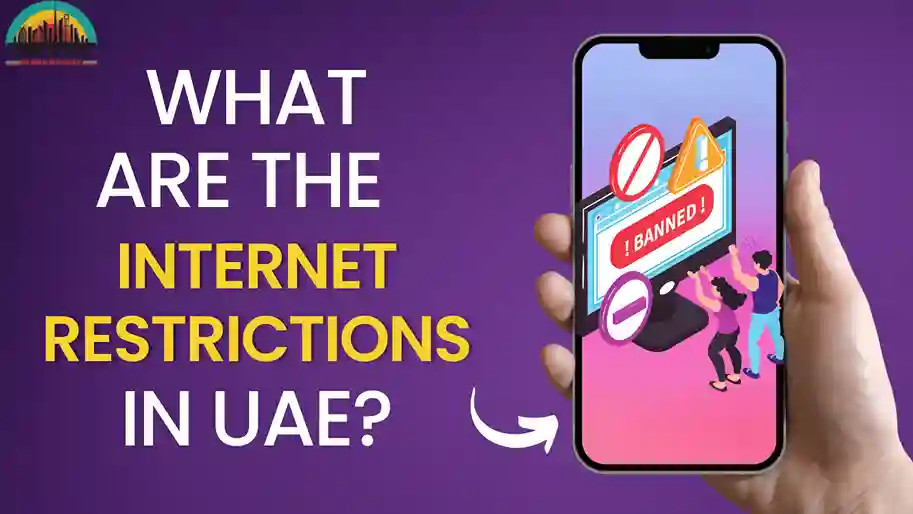What are the internet restrictions in UAE?

The United Arab Emirates (UAE) is known for its modern infrastructure and thriving economy, but it also has some of the strictest internet restrictions in the world. Understanding these limitations is crucial for residents and visitors alike. In this article, we will explore the various internet restrictions in the UAE, their implications, and what users can expect when navigating the digital landscape in this vibrant region.
Overview of Internet Restrictions in UAE
Internet restrictions in the UAE are implemented by the Telecommunications Regulatory Authority (TRA). These restrictions are primarily aimed at maintaining societal values, protecting national security, and preventing the dissemination of inappropriate content. The UAE has a sophisticated system for monitoring internet usage, which impacts everything from social media to online communication platforms.
Key Reasons for Internet Restrictions in UAE
Cultural Preservation: The UAE has a rich cultural heritage, and the government is keen on preserving its values. Many sites deemed contrary to local traditions are blocked.
National Security: The government imposes restrictions to prevent the spread of information that could threaten national security or incite unrest.
Protecting Youth: Internet restrictions are also in place to shield younger audiences from harmful content, including pornography and violence.
Economic Control: Certain VoIP services are restricted to protect local telecom companies and ensure a steady revenue stream.
Types of Internet Restrictions in UAE
Understanding the types of internet restrictions in the UAE can help users navigate the online environment more effectively.
1. Blocked Websites
Several categories of websites are routinely blocked in the UAE. These include:
Adult Content: Pornographic websites are strictly prohibited.
Gambling Sites: Online gambling is illegal in the UAE, and associated sites are blocked.
Political Content: Websites that promote political dissent, opposition parties, or views contrary to the UAE government may be inaccessible.
VoIP Services: Popular communication platforms like Skype, WhatsApp calls, and Facetime are often restricted or subject to limitations.
2. Censorship of Social Media
Social media platforms are subject to censorship in the UAE. While major platforms like Facebook, Twitter, and Instagram are available, content that violates local laws may be removed or restricted.
Hate Speech: Any content that promotes hate speech or incites violence is strictly monitored and removed.
Obscene Content: Posts considered obscene or offensive to cultural norms can lead to account suspensions or bans.
3. Internet Surveillance
The UAE government employs sophisticated surveillance techniques to monitor online activities. Users should be aware that their online behavior may be tracked, which serves as a deterrent for those considering violating local laws.
4. VPN Regulations
Many residents and tourists use Virtual Private Networks (VPNs) to bypass internet restrictions. However, the use of VPNs is also regulated. While they can be legally used for privacy and security purposes, using them to access blocked content can lead to legal consequences.
Implications of Internet Restrictions in UAE
The internet restrictions in the UAE have significant implications for residents and visitors.
1. Impact on Communication
The limitations on VoIP services restrict users’ ability to communicate freely with friends and family abroad. While text and image sharing may still occur, the inability to make free voice or video calls can be frustrating.
2. Business Concerns
For businesses, internet restrictions can impact operations, particularly for companies relying on online communication tools or social media marketing. Firms may need to adapt their strategies to comply with local laws, affecting overall productivity.
3. Social Media Usage
Given the restrictions on content, users must be cautious about what they post. Many choose to limit their social media activity to avoid potential repercussions, including fines or legal issues.
4. Legal Consequences
Violating internet restrictions can lead to severe penalties, including hefty fines or imprisonment. Understanding the laws governing internet usage is vital for anyone living in or visiting the UAE.
Navigating Internet Restrictions in UAE
While internet restrictions in the UAE can be challenging, there are ways to navigate the limitations effectively.
1. Using Alternative Communication Tools
For those who need to communicate internationally, exploring alternatives that comply with local regulations is essential. Apps that are permitted may provide basic functionalities that suffice for everyday communication.
2. Awareness and Education
Being informed about what content is permissible and what is not can help users avoid potential pitfalls. Educational initiatives aimed at increasing awareness about local laws can be beneficial.
3. Utilizing VPNs Responsibly
If considering the use of VPNs, it’s essential to understand their legal status. Users should employ VPNs for legitimate purposes, such as protecting personal information, while avoiding their use for accessing blocked content.
4. Engaging with Local Communities
Joining local expat forums and communities can provide valuable insights into navigating internet restrictions. Sharing experiences and strategies can help newcomers adapt more easily.
Conclusion
Understanding internet restrictions in the UAE is crucial for both residents and visitors. The government’s focus on maintaining cultural integrity, national security, and societal values results in a unique online environment that requires careful navigation. By being aware of these restrictions and adapting to them, users can enjoy a safer and more informed internet experience in the UAE.
In summary, while internet restrictions in the UAE may pose challenges, staying informed and using available resources can help individuals effectively manage their online presence in this dynamic region.
